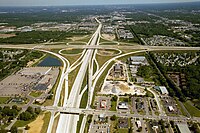
Photo from wikipedia
Abstract Ship voyage optimization systems are widely used in today's ocean-crossing ships to consider a ship's sailing safety and energy efficiency. Large uncertainties from the inputs of today's voyage optimization… Click to show full abstract
Abstract Ship voyage optimization systems are widely used in today's ocean-crossing ships to consider a ship's sailing safety and energy efficiency. Large uncertainties from the inputs of today's voyage optimization algorithms can reduce the reliability of voyage optimization systems, especially for more complex algorithms that involve more control variables in the optimization. This study first proposes a speed optimization algorithm, which considers the voluntary speed reduction for a ship voyage with fixed trajectories. Then, the capability of the proposed speed optimization method is investigated by comparing with conventional voyage planning methods that optimize a ship's sailing courses/trajectories. In particular, the effectiveness of handling uncertain inputs during the optimization process, such as ship speed-power performance models, metocean forecasts, is investigated for the two types of voyage optimization methods. Finally, the benefits of potential fuel saving are studied by incorporating this proposed algorithm for a ship's slow steaming strategies.
Journal Title: Ocean Engineering
Year Published: 2020
Link to full text (if available)
Share on Social Media: Sign Up to like & get
recommendations!